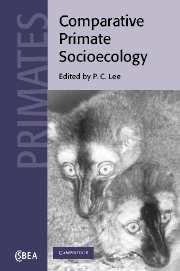Book contents
- Frontmatter
- Contents
- List of contributors
- Preface
- Part 1 Comparative methods
- Part 2 Comparative life history and biology
- Part 3 Comparative socioecology and social evolution
- 10 Lemur social structure and convergence in primate socioecology
- 11 Why is female kin bonding so rare? Comparative sociality of neotropical primates
- 12 Energetics, time budgets and group size
- 13 Ecology of sex differences in great ape foraging
- 14 Hominid behavioural evolution: missing links in comparative primate socioecology
- 15 Evolutionary ecology and cross-cultural comparison: the case of matrilineal descent in sub-Saharan Africa
- Editor's conclusion: Socioecology and social evolution
- Index
15 - Evolutionary ecology and cross-cultural comparison: the case of matrilineal descent in sub-Saharan Africa
Published online by Cambridge University Press: 24 August 2009
- Frontmatter
- Contents
- List of contributors
- Preface
- Part 1 Comparative methods
- Part 2 Comparative life history and biology
- Part 3 Comparative socioecology and social evolution
- 10 Lemur social structure and convergence in primate socioecology
- 11 Why is female kin bonding so rare? Comparative sociality of neotropical primates
- 12 Energetics, time budgets and group size
- 13 Ecology of sex differences in great ape foraging
- 14 Hominid behavioural evolution: missing links in comparative primate socioecology
- 15 Evolutionary ecology and cross-cultural comparison: the case of matrilineal descent in sub-Saharan Africa
- Editor's conclusion: Socioecology and social evolution
- Index
Summary
Introduction
The comparative method will always be an important tool when testing adaptive hypotheses about human behaviour, particularly as experimentation is not usually an option. Cross-cultural comparison has a long history in anthropology, but in recent decades, formal statistical comparison has fallen into decline. This was partly due to broad philosophical and ideational changes in the field as whole. The specificity and uniqueness of individual cultures are the favoured theme of most anthropological research, which is not quantitative. Even amongst cultural ecologists or sociobiologists, who were not opposed in principle to quantitative approaches, the appearance of cross-cultural studies reporting highly statistically significant associations between traits (without concern for the non-independence of cultures), that were sometimes accompanied by fantastical hypotheses, sowed suspicion of a statistical approach in the minds of those reading them.
Evolutionary studies of human behaviour of any kind can also be controversial, whether employing cross-cultural comparison or not. In social anthropology, the term ‘evolutionary’ is generally taken to imply the erroneous paradigm of a linear progression of stages that cultures move through from a more primitive to a less primitive state. Few social anthropologists today are even aware that the views of modern evolutionary ecologists could not be further from this position, and that it is the variation observed in phenotypes in different environments that is the central focus of research in evolutionary ecology. Amongst evolutionary biologists, the status of human sociobiology was really little better than in the social sciences, until very recently.
The field was not helped by an obsession with debating the extent to which any particular trait could be considered to be genetic or cultural in origin.
- Type
- Chapter
- Information
- Comparative Primate Socioecology , pp. 387 - 405Publisher: Cambridge University PressPrint publication year: 1999
- 9
- Cited by



